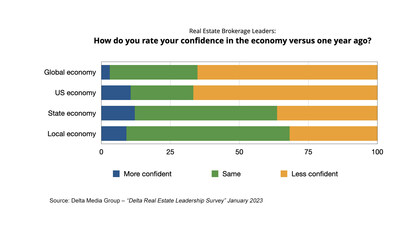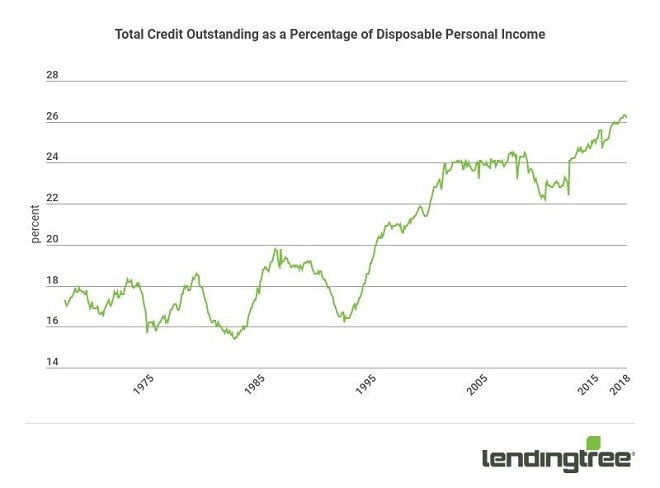Majority expects a decline in global and US economy – and profitability
Canton, OH – Jan. 12, 2023 (PRNewswire) Real estate brokerage leaders are rarely a pessimistic group, yet more than half believe the global economy (63 percent) and the US economy (51 percent) will deteriorate in 2023. That’s according to the new Delta Real Estate Leadership Survey of more than 100 brokerage leaders of firms collectively responsible for more than 60 percent of all transactions last year.

“Another bigger takeaway is that the closer to home, the more confident real estate brokerage leaders are about the economy improving over the next 12 months,” explained Michael Minard, CEO and owner of Delta Media Group.
Most (72 percent) real estate leaders believe their state economy will stay the same or improve over the next 12 months. An even larger majority (75 percent) believe their local economy will remain the same or improve.
The independent study found only 4% of real estate brokerage leaders believe the global economy will improve in 2023. However, many leaders are more bullish on their local economies, as 28% of real estate brokerage leaders believe their local economy will improve, and 25% believe their state economy will improve over the next 12 months.
“It’s important to note not a single real estate brokerage leader of the more than 100 professionals surveyed believes the global, US, state, or local economy will ‘improve significantly’ in 2023,” Minard added.

The survey also revealed real estate brokerage leaders were split on what they believe will happen to housing demand in their local markets in 2023. About one-third say it will improve, one-third say it will stay the same, and one-third believe it will deteriorate. Only 3% of those surveyed believe their local housing market will decline significantly in 2023.
Moreover, the survey gauged the confidence level of real estate brokerage leaders today compared to 12 months ago. The survey shows two in three leaders are less confident than a year ago in the global and US economies. In addition, about one in three are less optimistic about their state and local economies. But, overall, most real estate leaders (59 percent) have unchanged confidence in their state and local economies.
More bullish about their own business in 2023
More than half (53 percent) of real estate brokerage leaders see their profitability decreasing this year, and their total transactions dropping from 2022.
“What is surprising is despite the fact many real estate brokerage leaders believe their profitability and transaction count will decline in 2023, 56% believe their brokerage will increase their local market share,” said Minard, adding “They clearly see opportunity in a chaotic market.”About the survey
The independent research, conducted in December 2022 by Delta Media Group, one of America’s largest technology solutions providers for real estate brokerages, collected responses from more than 100 broker-owners and top brokerage executives representing firms that were responsible for more than 60 percent of US residential real estate transactions last year.
Nearly one in five (18 percent) of the leaders responding manage brokerages with more than $3 billion to over $10 billion in projected 2022 transactions; 23 percent manage brokerages with $1 billion to $3 billion; 21 percent manage brokerages with $501 to $999 million, and 38 percent manage brokerages with $500 million or less in total transactions.
Delta survey participants included leaders from all sizes of brokerages, with nearly one in 10 (9 percent) managing brokerages with 20 agents or fewer; slightly more than one in four leaders (26 percent) managing brokerages with 21 to 100 agents; 41 percent of leaders operating brokerages with 101 to 500 agents; 9 percent of leaders managing brokerages with 501 to 1,000 agents; and 15 percent of leaders operating brokerages with more than 1,000 agents.
Forty-three percent of the respondents are 60 years or older; 34 percent are 50 to 59 years old; 20 percent are 40-49 years old; and 3 percent are 31 to 39 years old. In addition, 77 percent are male, 21 percent are female, and 2 percent selected “not listed.”About Delta Media
Delta Media Group, Inc., located in Canton, Ohio, is a leading and trusted technology partner for many of the best-known real estate brands, including 75 LeadingRE Affiliates, 6 of the 12 largest Coldwell Banker brokerages in the nation, and over 50 top-ranked brokerages nationwide. Discover more at deltamediagroup.com.
Media contacts:
Kevin Hawkins (206) 866-1220
kevin@wavgroup.com
SOURCE Delta Media






